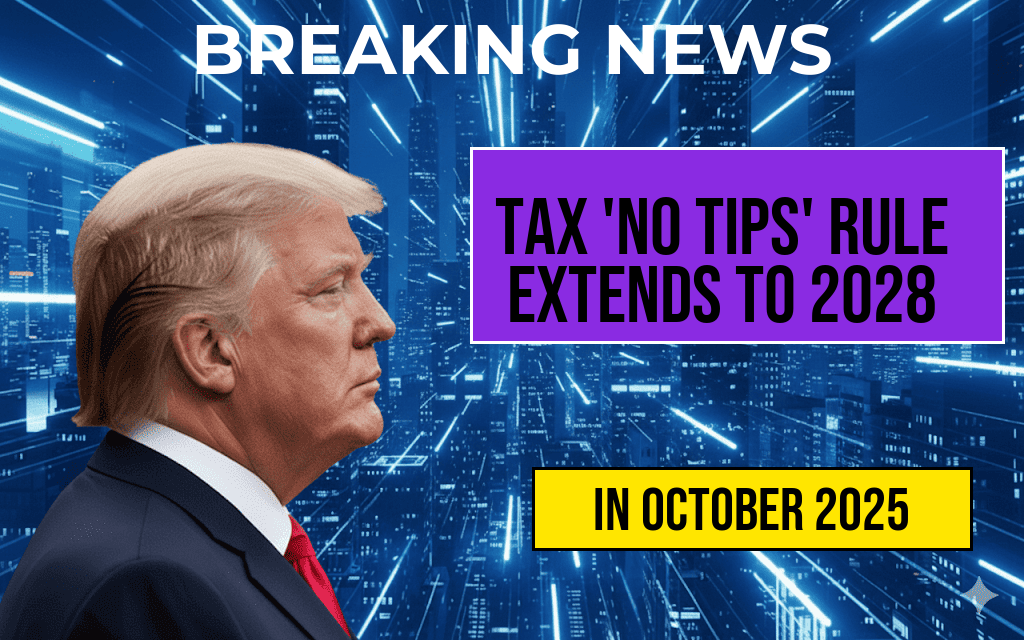Tax ‘No Tips’ Rule Extends Through 2028 with a $25,000 Annual Cap You Can’t Overlook
A federal tax provision impacting tipped employees has been extended through 2028, capping the amount of tip income subject to taxation at $25,000 annually. This rule, often referred to as the “No Tips” rule, was initially introduced as part of broader tax reforms aimed at simplifying income reporting for service workers and easing compliance burdens on small businesses. While critics argue it limits earning potential for tipped workers, proponents highlight the measure’s role in streamlining payroll processes and reducing tax evasion. The extension, signed into law amid recent legislative updates, solidifies this cap for the next five years, affecting millions of workers across the hospitality, foodservice, and personal service industries.
Background of the ‘No Tips’ Tax Rule
The tax code historically treats tips as taxable income, requiring both employees and employers to report and pay taxes accordingly. However, the “No Tips” rule was introduced as a compliance simplification, setting a threshold where tips up to $25,000 per year are exempt from certain reporting requirements, such as detailed documentation or withholding adjustments. This provision was part of the Taxpayer Relief and Simplification Act of 2017, aiming to ease the administrative burden on small businesses and reduce instances of underreporting.
Details of the Extension and Cap
| Feature | Description |
|---|---|
| Extension Period | Through December 31, 2028 |
| Annual Tip Income Cap | $25,000 |
| Impact on Tax Reporting | Reduces reporting requirements for eligible tips under the cap |
| Affected Industries | Hospitality, foodservice, personal care, and other tipped service sectors |
The extension maintains the existing threshold, meaning that tips earned up to $25,000 per year are subject to simplified tax procedures. Workers earning more than this amount will need to report additional income, but the cap ensures a manageable reporting process for the majority of tipped employees.
Industry and Worker Impacts
For tipped workers, particularly in high-volume restaurants and bars, the cap can influence earning strategies and tax planning. While some employees may see benefits through reduced administrative burdens, others worry that the cap may limit earning potential or lead to discrepancies in income reporting. Employers also experience fewer compliance challenges, as the simplified rules reduce paperwork and minimize the risk of audit issues related to tip reporting.
According to a 2022 report from the Department of Labor, approximately 10 million workers in the U.S. rely on tips as a significant part of their income, with a sizable portion earning close to or above the $25,000 threshold annually. The extension ensures these workers continue to benefit from streamlined tax reporting until at least 2028, providing some stability amid ongoing debates over wage policies and labor rights.
Legislative Context and Future Considerations
The extension was included in the recent bipartisan budget agreement, reflecting a consensus on maintaining certain tax simplification measures. Legislators from both parties acknowledged the importance of balancing regulatory compliance with supporting service workers’ income stability. However, discussions about potential reforms to tip taxation and reporting are ongoing, especially as economic conditions evolve and workforce dynamics shift.
Advocates for increases in the cap argue that it does not adequately reflect inflation or the rising cost of living, suggesting future legislative efforts may seek to raise or eliminate the cap entirely. Conversely, some policymakers emphasize the importance of maintaining clear tax boundaries to prevent abuse and ensure fair taxation.
Resources and Further Reading
- Taxation in the United States (Wikipedia)
- Forbes: How Tax Changes Impact Tipped Employees
- U.S. Department of Labor: Tipped Employee Regulations
As the extension of the ‘No Tips’ rule through 2028 becomes part of the regular tax landscape, tipped workers and employers alike will need to stay informed about compliance requirements and potential policy shifts that could redefine income reporting standards in the years ahead.
Frequently Asked Questions
Question
What is the duration of the Tax ‘No Tips’ rule extension?
The Tax ‘No Tips’ rule has been extended through 2028, providing ongoing clarity for employers and employees regarding tip reporting and taxation.
Question
What is the annual cap on tips under this rule?
The rule sets a $25,000 annual cap on tips that are not subject to taxation, meaning tips exceeding this amount are taxable.
Question
Who does the ‘No Tips’ rule apply to?
The rule primarily applies to employers and employees in the hospitality and service industries, clarifying how tips should be reported and taxed.
Question
How does the cap impact tip reporting for employees?
Employees can report up to $25,000 in tips annually without additional tax implications; tips beyond this amount are subject to taxation.
Question
Are there any changes to the taxation rules for tips with this extension?
No significant changes have been made to taxation rules; the extension mainly provides clarity and continuity regarding the existing tip reporting framework until 2028.

Leave a Reply